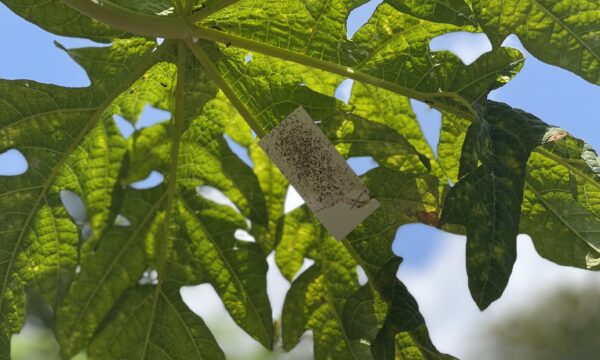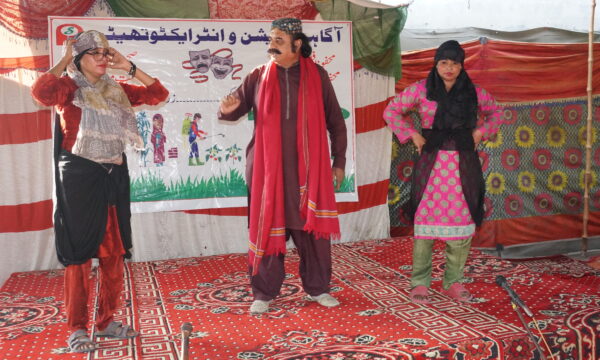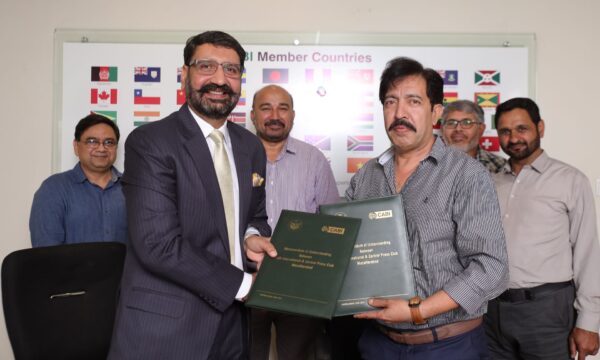By Saleem Shaikh. Reblogged from SciDev.Net

Copyright: G.M.B. Akash / Pano
A severe infestation of the papaya mealybug (Paracoccus marginatus) nearly wiped out papaya orchards in Pakistan before the largely farmed country decided to replace conventional chemical pesticides that were ineffective with natural predators that proved to be successful.
The system was developed by agro-biotechnologists and entomologists at the Pakistani chapter of the UK-based Centre for Agriculture and Bioscience International (CABI) who introduced the use of Acerophagus papayae, a parasitoid (insects whose larvae parasite upon and eventually kill the host), to effectively control the mealybug infestation.
“Farmers are happy with this cost-effective, pesticide-free technique to deal with the mealybug and now see possibilities of recovering their papaya farms,” says CABI research coordinator Abdul Rehman.
He regrets though that by the time the biological method became available many farmers had already shifted to other crops.
Papaya once covered some 921 hectares in the two coastal provinces of Sindh and Balochistan, according to the National Agriculture Research Council (NARC). But, after the first mealybug attack on papaya was reported in 2008, the area under papaya had shrunk to 307 hectares by 2014.
“Demonstration of the bio-control technique and awareness building among farmers helped wide-scale adoption and resulted in over 80 per cent control of the papaya mealybug.”
Amjad Pervez, NARC
Rehman tells SciDev.Net that after the pest had gripped almost 80 per cent of the papaya orchards, CABI, US Development Agriculture and the US Agency for International Development initiated the biological control programme in close collaboration with NARC to stop the pest’s possible spread to other more important commercial crops.
In 2014, under CABI’s papaya pest management programme, A. papayae specimens were collected from the coastal areas near the port city of Karachi, reared in the laboratory and then released into papaya plantations after screening and environmental assessments.
CABI researchers also set up a Natural Enemies Field Reservoir on the farmers’ fields to breed the A. papayae parasitoid as well as eight other natural predators of the papaya mealybug.
Amjad Pervez, director-general at the NARC’s Karachi-based regional office, says that the advantage of the bio-control approach lies in its simplicity and in the fact that it is self-sustaining.
“Demonstration of the bio-control technique and awareness building among farmers helped wide-scale adoption and resulted in over 80 per cent control of the papaya mealybug,” Pervez says. “Besides, the process was non-laborious, highly affordable and simple enough for farmers not to need support from government agencies.”
Rehman’s team has hammered out a three-pronged plan to promote the field reservoirs through public-private partnerships.
“The bio-control approach has saved the papaya (farming) and also increased profits by reducing expenses on the pesticide sprays once used to fight the pest.”
Abdul Majeed Nizamani, Sindh Abadgar Board
“The plan shall be implemented to boost research and development to strengthen the bio-control process to completely contain papaya mealybug. Sindh and Balochistan provinces’ farmers’ organisations and vegetable and fruit traders’ associations will also be engaged in this regard as key stakeholders,” Pervez explains.
“Controlling the papaya mealybug has helped contain its potential spread to commercial crops like citrus, tomato, aubergine, peppers, mulberry, beans and peas, sweet potato, mango, cherry, and pomegranate. Annual losses, had these crops been affected, would have run into millions of dollars,” says Pervez.
Rehman says Pakistan’s experience in safely controlling the mealybug has been shared with CABI chapters in the Asia-Pacific, European, and African countries.
“Entomologists and fruit pest experts have already communicated possibilities for replication of the bio-control approach, with some necessary modifications in countries like Congo, Indonesia, Malaysia, Nigeria, Sri Lanka, Taiwan and Thailand” he says.
Mealybugs have great resistance to most pesticides. For one thing they exude waxy secretions that can insulate them against chemicals and for another they have developed resistance to most commonly used chemical insecticides, according to a comprehensive Indian study published by Springer earlier this year.
First detected in Mexico in 1955, the papaya mealybug had spread to the Caribbean and Latin America by the 1990s and to the Pacific and South Asian countries through the first decade of this century.
Abdul Majeed Nizamani, president of the Sindh Abadgar Board, a farmers’ organisation, believes that papaya farming would have been completely wiped out in Pakistan if not for the bio-control measures. “The bio-control approach has saved the papaya (farming) and also increased profits by reducing expenses on the pesticide sprays once used to fight the pest,” Nizamani says.
This article was originally published on SciDev.Net. Read the original article→
1 Comment
Leave a Reply
Related News & Blogs
Empowering women farmers in Pakistan with pest control knowledge
Women farmers in Pakistan play a central role in the country’s economy. However, many struggle to access essential information about sustainable farming approaches. Women make up nearly 66% of the agricultural workforce in Pakistan. Yet they receive ve…
30 May 2025





Fascinating! It can be done in Pakistan, a great news for me. Why then this is not used for the cotton mealybug? Here the gain is in billions of dollars.
How do I contact Mr.Amjad Pervez, Director General of Narc? & Sindh Abadgar Board?